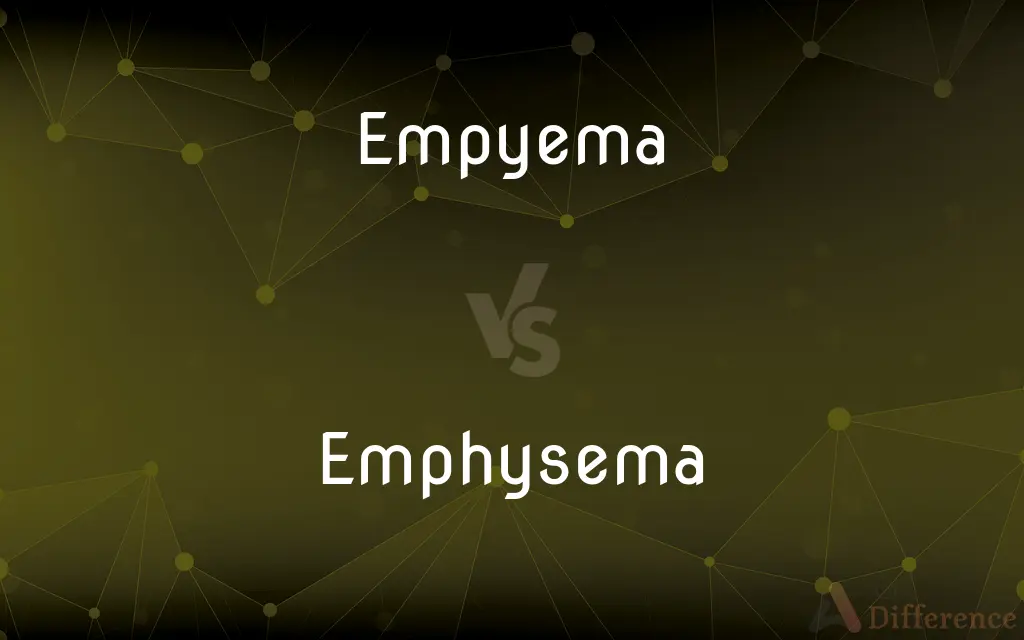Empyema vs. Emphysema — What's the Difference?
Edited by Tayyaba Rehman — By Fiza Rafique — Updated on September 30, 2023
"Empyema" refers to pus accumulation in a body cavity, commonly the pleural space. "Emphysema" is a lung condition where air sacs (alveoli) are damaged, causing breathlessness. Both involve the respiratory system but differ in nature and treatment.

Difference Between Empyema and Emphysema
Table of Contents
ADVERTISEMENT
Key Differences
"Empyema" is a medical term that denotes the accumulation of pus in a body cavity, most frequently in the pleural space between the lung and chest wall. This condition is usually secondary to an infection, such as pneumonia. When bacteria invade this space, it triggers an immune response, leading to pus formation. On the other hand, "Emphysema" is a progressive lung disease that's part of chronic obstructive pulmonary disease (COPD). It involves the enlargement and eventual destruction of the air sacs (alveoli) in the lungs.
When considering the causes, "Empyema" typically results from infections, with pneumonia and tuberculosis being common culprits. The spread of the infectious agent to the pleural space can lead to inflammation and pus buildup. Conversely, "Emphysema" is commonly attributed to long-term exposure to irritants, especially cigarette smoke. Over time, the lung tissue gets damaged, causing shortness of breath as the primary symptom.
"Empyema" often manifests with symptoms like fever, chest pain, and difficulty breathing. It's crucial to treat it promptly, as it can become life-threatening if left unchecked. Treatment typically involves antibiotics and draining the pus from the pleural space. In the realm of "Emphysema," symptoms revolve around breathlessness, which progressively worsens. Unfortunately, the lung damage in Emphysema is irreversible, but treatments can slow its progression and improve quality of life.
Comparison Chart
Basic Definition
Pus accumulation in a body cavity.
Damage and enlargement of lung air sacs (alveoli).
Primary Cause
Infections, e.g., pneumonia.
Long-term exposure to irritants, especially cigarette smoke.
ADVERTISEMENT
Common Symptoms
Fever, chest pain, difficulty breathing.
Progressive breathlessness.
Treatment
Antibiotics, draining pus.
Medications, oxygen therapy, pulmonary rehab.
Nature of Condition
Acute, infection-driven.
Chronic, progressive.
Compare with Definitions
Empyema
An inflammatory response leading to pus in the pleural cavity.
Empyema often requires prompt medical intervention.
Emphysema
A chronic lung condition damaging air sacs (alveoli) leading to breathlessness.
Years of smoking left him with severe Emphysema.
Empyema
A condition typically secondary to respiratory infections.
Untreated pneumonia can sometimes lead to Empyema.
Emphysema
Part of the group of diseases known as COPD.
Emphysema patients often need inhalers for better breathing.
Empyema
Reflects bacterial invasion in spaces like between the lung and chest wall.
Empyema can make breathing painful and difficult.
Emphysema
Resulting from long-term exposure to lung irritants.
Exposure to industrial pollutants can also cause Emphysema.
Empyema
A serious condition often needing drainage and antibiotics.
Surgery might be necessary if Empyema doesn't respond to initial treatments.
Emphysema
Involves enlargement and rupture of alveoli, reducing oxygen exchange.
Emphysema affects the lung's ability to exchange oxygen and carbon dioxide.
Empyema
Accumulation of pus in a body cavity, especially the pleural space.
The patient was diagnosed with Empyema secondary to pneumonia.
Emphysema
Characterized by shortness of breath and decreased lung function.
Walking up stairs became a challenge due to his Emphysema.
Empyema
An empyema () is a collection or gathering of pus within a naturally existing anatomical cavity. For example, pleural empyema is empyema of the pleural cavity.
Emphysema
A pathological condition of the lungs marked by an abnormal increase in the size of the air spaces, resulting in labored breathing and an increased susceptibility to infection. It can be caused by irreversible expansion of the alveoli or by the destruction of alveolar walls.
Empyema
The presence of pus in a body cavity, especially the pleural cavity.
Emphysema
An abnormal distension of body tissues caused by retention of air.
Empyema
(medical sign) A collection of pus within a naturally existing anatomical cavity (as opposed to an abscess, which occurs in a newly formed cavity).
Emphysema
(pathology) An abnormal accumulation of air or other gas in tissues, most commonly the lungs.
Empyema
A collection of blood, pus, or other fluid, in some cavity of the body, especially that of the pleura.
Emphysema
(medicine) Pulmonary emphysema, a chronic lung disease, one type of chronic obstructive pulmonary disease.
Empyema
A collection of pus in a body cavity (especially in the lung cavity)
Emphysema
A swelling produced by gas or air diffused in the cellular tissue.
Emphysema
An abnormal condition of the lungs marked by decreased respiratory function; associated with smoking or chronic bronchitis or old age
Common Curiosities
How does Emphysema affect the lungs?
Emphysema damages and enlarges the air sacs (alveoli), impeding effective oxygen exchange.
What is Empyema?
Empyema refers to the accumulation of pus in a body cavity, usually the pleural space.
Is smoking a risk factor for both conditions?
Smoking is a primary risk factor for Emphysema, while Empyema is mainly caused by infections.
Are the damages from Emphysema reversible?
No, the lung damage from Emphysema is irreversible, but treatments can manage symptoms.
How is Empyema treated?
Treatment involves antibiotics and often drainage of the accumulated pus.
Can Empyema spread from one person to another?
No, Empyema itself is not contagious, but the underlying infection like pneumonia can be.
Share Your Discovery

Previous Comparison
Carolling vs. Caroling
Next Comparison
Foggy vs. CloudyAuthor Spotlight
Written by
Fiza RafiqueFiza Rafique is a skilled content writer at AskDifference.com, where she meticulously refines and enhances written pieces. Drawing from her vast editorial expertise, Fiza ensures clarity, accuracy, and precision in every article. Passionate about language, she continually seeks to elevate the quality of content for readers worldwide.
Edited by
Tayyaba RehmanTayyaba Rehman is a distinguished writer, currently serving as a primary contributor to askdifference.com. As a researcher in semantics and etymology, Tayyaba's passion for the complexity of languages and their distinctions has found a perfect home on the platform. Tayyaba delves into the intricacies of language, distinguishing between commonly confused words and phrases, thereby providing clarity for readers worldwide.















































